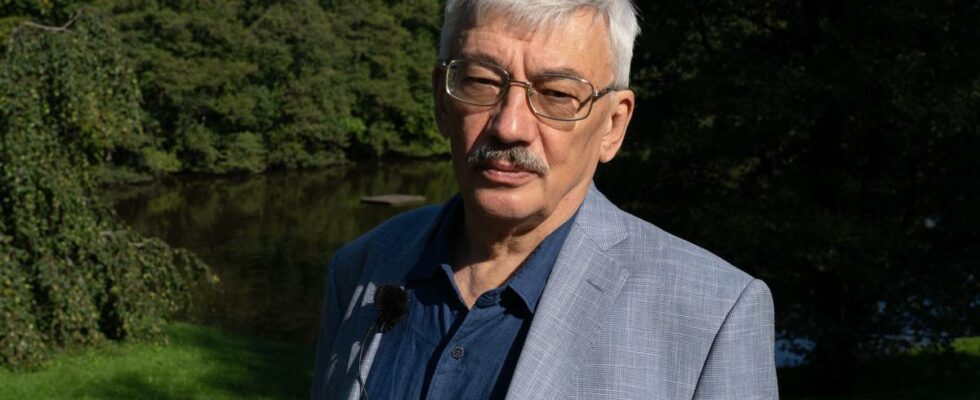– They look as if they are on their way from unfreedom to freedom, says Oleg Orlov to news. We are standing in Frognerparken with Sinnataggen and the rest of Vigeland’s life-affirming granite people around us. Oleg Orlov in front of Sinnataggen in Frognerparken on 5 September. Photo: Hallgeir Aunan / news Orlov received the peace prize in 2022. In February, a Russian court threw him in prison. Orlov was in prison for two years, and thought he was going to stay. He didn’t know he was a piece in a big game. A swap that ended on 1 August with Russia and six other countries exchanging 26 prisoners. For Putin, the main gain was intelligence officer Vadim Krasikov. Imprisoned in Germany for killing a Chechen-Georgian rebel leader. Orlov refused to ask Putin for a pardon, but was nevertheless flown into exile in Germany. Read more: Putin and Stalin Orlov’s “crime” was “discrediting” Russia’s armed forces. In addition, the prosecution indicated that he had spread hate speech about the state. It was in particular an article first published by French Mediapart that provoked. “They wanted fascism. They got it’, was the title. Orlov explains. – In 1995, the Russian Academy of Sciences put forward a definition of “fascism” at the behest of the then president Boris Yeltsin. Among the characteristics are a notion of the superiority of one’s own nation, a cult around a leader, suppression of anyone who thinks differently and the use of war to resolve conflicts between states. – Putin’s regime hits all the marks. The Ukrainians’ existence as a separate people is even being denied, says Orlov. He believes the Russian regime is more and more reminiscent of Stalin’s dictatorship. Stalin ruled Russia from 1924 until his death in 1953. Millions of people were executed, died in penal colonies or had their lives destroyed by political persecution. – Putin’s regime more and more like Stalin’s, says Orlov. The leader of the Communist Party of Russia Gennady Zyuganov lays flowers at the grave of Soviet dictator Josef Stalin on March 5. Photo: ALEXANDER NEMENOV / AFP Brainwashing and fear – Putin’s repression does not have the same mass character. But the punishments for political and other crimes are harsh and often very long, explains Orlov. He describes it as “21st century fascism”. Fewer people are arrested. But information about arrests and harassment is spread at lightning speed with modern technology. This way of spreading fear is exploited by the regime. Orlov believes that Putin’s state apparatus and other supporters are trying to brainwash the population with propaganda on all platforms 24 hours a day. He knows how it affects people. For many years he has led the Human Rights Center Memorial. The center has helped survivors who are exposed to pressure or threats as a result of political attitudes. President Vladimir Putin during a meeting with schoolchildren in Kyzyl on September 2. The purpose was “a conversation about the important”, which is a permanent item in the patriotic upbringing in school. Photo: VYACHESLAV PROKOFYEV / AFP The parent organization Memorial was founded in 1987 and has since documented the extent of political repression and the large number of victims during the Soviet period. Through several judgments from December 2021, the Russian judiciary has banned Memorial’s organizations from operating in the country. In 2022, Memorial was awarded the Nobel Peace Prize. Indicators everywhere – Take a meeting like between the two of us, says Orlov as we sit on a bench a little on the edge of Frognerparken. – We are having a private conversation. Perhaps it is about the war in Ukraine. Then a third person walks by and hears what we are talking about. If he wants, he can report us and claim that we are engaging in propaganda. The two of us, who were just having a private conversation. This is how he explains how Russians now feel. They are again encouraged to keep quiet about each other. This particularly applies to people who speak out against the war in Ukraine, or the “special operation” in official parlance. We do not know the extent of silencing. But the impact of the calls is noticeable. People are anxious about friends of friends they don’t know. Longing for home Oleg Orlov is 71 years old, half a year younger than Vladimir Putin. He sincerely hopes that Putin will not remain in office until 2036, as the current constitution allows for. He envisions a chaotic power struggle on the day the “dictator” disappears. But then the democratic forces in civil society must also be prepared. On reforming criminal law and the courts. On the battle over what kind of country Russia will be in the future. The Russian editor Dmitrij Muratov (tv) was one of the winners of the Nobel Peace Prize in 2021. He acted as one of the defenders of Oleg Orlov during the trial that led to the verdict on 27 February. The picture was taken on 16 February. Photo: Tatyana Makeyeva / Reuters – I really hope I can return and participate. I really want it. I would very much like to work with my colleagues inside Russia, at home. In December 2022, Orlov was with Oslo when Memorial, together with human rights defenders in Belarus and Ukraine, received the Nobel Peace Prize. It was an honor. But all human rights defenders know that the battles are at home. Read more: Published 06.09.2024, at 07.28
ttn-69
– Putin’s regime more and more like Stalin’s – news Urix – Foreign news and documentaries

